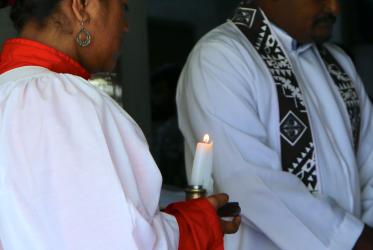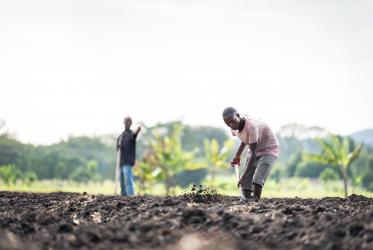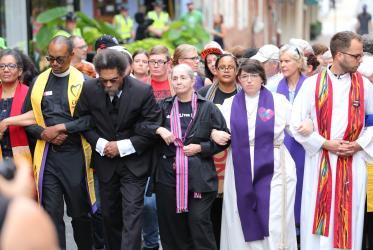Letter from Konrad Raiser to H.E. Ernesto Zedillo Ponce de León, President of Mexico, April 2001.
Your Excellency,
On behalf of the World Council of Churches I wish to extend our best wishes to you and the other members of the United Nations Secretary-General's High-level Panel on Financing for Development (FfD) for every success in your efforts to address the need for increased and appropriate financing for sustainable development.
The World Council of Churches (WCC) has, for almost all of the 53 years of its existence, emphasized both the importance of global justice and equitable sharing of resources as essential prerequisites for human development. The WCC has also advocated appropriate public and non-governmental policies which will be of real benefit to the poor. In keeping with that tradition, the Council in collaboration with the Lutheran World Federation (LWF), other churches and church-related organizations have collaborated together as an Ecumenical Team to follow the preparations for the International Conference on Financing for Development to be held in Mexico next year. Other organizations which have joined the WCC and LWF on the Ecumenical Team include the Canadian Council of Churches, the General Board of Church and Society of the United Methodist Church, and Sisters of Mercy. Enclosed you will find a background paper which was prepared for the Financing for Development initiative. This document, entitled "Justice: The Heart of the Matter - An Ecumenical Approach to Financing for Development", takes up the six areas identified by the UN Member States and the Secretariat as critical to the ecumenical community concerning financing for development and outlines areas for future commitments and common action.
Recognizing the importance of the panel in which you will serve as a moderator, we would appreciate your consideration of these proposals and welcome an opportunity to enter into dialogue with you and the high-level panel about them.
Our aim, which we know you share, is not just the reduction, but the elimination of poverty. In a world rife with conflicts, most of which have at their root poverty, economic inequity and competition for the control of resources, the work of your panel is urgent and essential to save precious human lives around the world.
Respectfully,
Konrad Raiser
General Secretary
"Staying Engaged - For Justice," statement of the Ecumenical Team to the 4th Preparatory Committee, New York, January 2002.
The ecumenical community welcomes the FfD process as an unprecedented opportunity for the global community to collectively - and with determination - address the urgent issues of global economic justice. The dominant neo-liberal economic model exacerbates poverty, inequality and exclusion and is an impediment to the implementation of the Millennium Development Goals. The global community cannot remain passive spectators of the relentless march of a globalizing economic system which allows a few unaccountable economic and financial actors to wield excessive power at the expense of the vast majority of the world's peoples.
Financing must not be an end in itself, but focused on people-centred development. The recent financial crises in Asia and the current hardships faced by the people of Argentina are two stark illustrations of failed economic models. The ecumenical community cannot endorse economic models that simply focus on increasing monetary wealth for the few without meaningful mechanisms to address poverty eradication and equitable development.
Justice is the heart of the matter. It is the key to the realization of human dignity and development within secure and sustainable communities. Such communities require a just and moral economy where people are empowered to participate in decisions affecting their lives, and where public and private institutions are held accountable for the social and environmental consequences of their operations. Justice demands the transformation of global economic governance and the international financial system so that their institutions are accountable to and serve all people, not simply the wealthy and powerful.
Staying engaged requires tangible commitments and actions. Engagement without demonstrated commitment is a waste of time. At the very least the Monterrey conference must make commitments to:
The principle of the primacy of fair trade, to include:
- Immediate market access for developing countries
- Elimination of the structural inequities in the global trading system
- Mutuality, transparency and public participation in future trade negotiations.
The Jubilee principle of a fresh start, to include:
- Immediate cancellation of the external debt of the poorest countries
- Substantial debt reduction for heavily indebted middle-income countries
- The establishment of an independent and fair debt arbitration mechanism for current and future loans, which will promote ethical lending and borrowing policies.
The principle of democratization of the international financial system, to include:
- Strengthening ECOSOC's capacity to exercise its responsibility in the domains of development, economics, finance, trade, and social policy
- Democratizing the decision-making processes within the Bretton Woods institutions and the WTO
- Establishing within the UN system a global forum on taxation to study and propose new forms of taxation and support national efforts to counteract excessive tax competition and tax evasion.
Real value cannot be expressed in monetary terms, nor can life - and that which is essential to sustain it - be commodified. To "remake the world" and tackle growing inequality, concentration of power, and social exclusion, a people-centred approach to financing for development is required. To the implementation of these principles and goals the ecumenical community stays engaged and committed.
"Engagement with Commitment ?", press release issued by the Ecumenical Team, Monterrey, Mexico, 19 March 2002.
To claim that an international economic and financial system based on "market forces" will address the fundamental challenges of financing for development is a form of "science fiction". The debt burden of the world's poorest countries must be acknowledged as an international scandal, and political goodwill be mobilised to eliminate it without delay.
"Market Forces" or Greed?
The economic and financial indicators published in the reports of all the relevant international multilateral institutions point incontrovertibly to the increasingly unconscionable inequities in the global human community. What stares us in the face is a world in which the material overabundance enjoyed by a small percentage of this community exists and continues to grow side by side with the deprivation and exclusion of many.
Even in the developed countries themselves, the free reign of "market forces" leads to glaring injustices and growing gaps. One only need take the common example of corporate practice, in which, in the name of such forces, thousands of workers are laid off, the already excessive remuneration of top executives is simultaneously increased, and the stock market value of the company automatically goes up. The growing power and reach of global financial markets pose an even greater threat to equitable development.
The engine driving these forces - from Enron to Argentina - must be named for what it is: outright greed. How can we rely on such a dysfunctional engine to take us toward sustainable development?
External Debt
The debt burden of developing countries remains a fundamental obstacle to poverty eradication and human development for all within just and sustainable communities. All the conventional debt relief initiatives proposed so far by bilateral and multilateral creditors, including HIPC, have failed to adequately address the moral and financial crisis faced by people in low-income countries. Likewise, the FfD process has failed to give due recognition to the urgency of finding a comprehensive and lasting solution to the debt crisis if any real progress is to be made in achieving the Millennium Development Goals.
Justice demands the outright cancellation of all illegitimate debts and the elimination of Structural Adjustment Programs. The root causes of injustice and inequality underlying the debt crisis must be addressed. The credibility of the Northern countries' commitment to financing for development in the post-Monterrey context hinges in a fundamental way on their willingness to take up this challenge.
The Ecumenical Team advocates the Jubilee principle of a fair start, to include:
- the outright cancellation of the bilateral and multilateral debts of the poorest countries within the next five years;
- substantial debt reduction for severely indebted middle-income countries;
- immediate repatriation to the countries concerned of funds held by foreign banks obtained from corrupt public officials;
- the elimination of structural adjustment programs (SAPs) imposed by of such programs to intense public scrutiny in the countries concerned;
- the establishment of an independent, fair and transparent arbitration mechanism between sovereign debtors and their creditors, which will, in addition, be responsible for promote ethical lending and borrowing policies. This mechanism should be under the guidance of the United Nations, with four key elements:
- a neutral decision-making body;
- the right of all stakeholders to be heard;
- the protection of the debtor's basic needs, and
- a guarantee of an automatic stay of debt servicing once the case is opened.
Statement on the proposed "Monterrey Consensus Document" issued by the Ecumenical Team, 18-22 March 2002.
Critique of the Monterrey Consensus Document
Financing cannot and must not be seen to be an end in itself. It must focus on people-centered development. But this is a concept which has been pushed to the margins of the FfD process. We should not forget that we live in a world in which the powerful 20% of the world's population consumes more than 83% of the global income; a world rife with conflicts, most with poverty at their root; a world characterized by economic inequity and competition for the control of resources.
The Monterrey Consensus Document offers too little to such a world. It is not explicit either on control of financial markets or on the promotion of equity and human rights as factors in world trade. There is not even an explicit time frame to meet the commitments set out in the document. We believe that this is what this world expects from the nations and global economic institutions related to financing for development.
It is also evident that the drastic financial liberalization that has so significantly shaped the results of the FfD process, harms developing countries rather than benefits them. Contrary to the views of those whose ideas have influenced the FfD process, it exposes economies with weak financial infrastructures to the speculative forces of world financial markets, shaking their socio-economic integrity to breaking point. It is the sovereign right of each nation to take discretionary capital control measures whenever necessary. It is the duty of every nation to promote the common goal of economic prosperity for all and to work to re-shape the future agendas of the International Financial Institutions in such a way as to prevent policy discussions from unilateralism when it comes to capital flows and investment.
Are not the lessons drawn from the financial crisis in Asia and the virtual social, political and economic collapse of Argentina not enough to demonstrate the failure of conventional economic models which ignore the development of the people in favour of the growth of financial capital?
The instrument of Poverty Reduction Strategy Papers (PRSPs) under the HIPC programme, has failed to solve the financial problems of the Highly Indebted Countries because it is tied to Structural Adjustment programmes (SAPs) which shift resources from the poor to the rich, nationally and globally. The WCC flatly rejects such economic models as being contrary to the notion of economic equity sought by Christians.
The Monterrey Consensus Document is notably uncritical especially of the neo-liberal economic model. This model holds out no real hope for eliminating or even reducing poverty, but rather continues to exacerbate it. It increases inequality and excludes communities around the world. This model was neither critiqued during the FfD preparation process nor mentioned in the final document. We are concerned that a United Nations conference will again be dominated by the neo-liberal economic policies of the World Trade Organization, the World Bank and the International Monetary Fund.
The policies of these institutions have not changed significantly from those our general secretary, Rev. Dr Konrad Raiser, criticised in his open letter to UN Secretary-General Kofi Annan, at the time of the World Summit on Social Development in June 2000. They have failed to bridge the gap between the rich and the poor or to achieve greater equality. Instead they have contributed to widening the gap to the virtual exclusion of an increasing number of people languishing in poverty, to widespread social disintegration and, by condoning economic crimes and contributing to wars, pose a present threat to peace and international security.
Tangible Commitments and Actions
We have all witnessed how the declarations pile up year after year without serious implementation. Like so many others the Monterrey Consensus Document does not propose any binding obligations. This leads us to the question about which, if any, countries actually intend to implement the six areas outlined for financing for development. We hope our doubts are unfounded, and that states will declare their intention to implement to the full these minimal norms. This will not be considered enough by people in poverty throughout the world. Thus we urge the UN to undertake a critical review of the neo-liberal economic paradigm and to attend to the following three major points: 1) the elimination of structural inequalities in the global trading system and the establishment of mutuality, transparency and public participation in future negotiations; 2) pursuit of a permanent solution to the debt problem both for poor countries and middle-income countries starting with an immediate cancellation of the external debt of poor countries and setting up, under UN auspices, an independent and fair debt arbitration mechanism for current and future loans which will promote ethical lending and borrowing policies; and 3) strengthen the UN's role in the fields of global economic, finance, trade and social policy through strengthening the capacity of ECOSOC and UNCTAD to deal effectively with these issues.
The WCC advocates a people-centred approach
The WCC has, for almost all of the 54 years of its existence, emphasized both the importance of global justice and equitable sharing of resources as essential prerequisites for human development. The WCC has also advocated appropriate public and non-governmental policies which will be of real benefit to people in poverty. In keeping with that tradition, the WCC and the Lutheran World Federation (LWF), together with other churches and church-related organizations, have cooperated as an Ecumenical Team to follow the preparations for the International Conference on Financing for Development to be held in Monterrey, Mexico, 18-22 March 2002. Other organizations which have joined the WCC on the Ecumenical Team include the Latin American Council of Churches (CLAI), the General Board of Church and Society of the United Methodist Church (USA), the United Church of Christ (USA), the Sisters of Mercy, the International Shinto Foundation and the Anglican Communion.
Based on a document entitled, Justice: The Heart of the Matter - An Ecumenical Approach to Financing for Development, the Ecumenical Team has taken up the six areas identified by the UN Member States and the UN Secretariat as critical in financing for development.
Real value, in the final instance, cannot be expressed in monetary terms. Life, and that which is essential to sustain it, cannot be commodified. We firmly believe, and reiterate now, that a people-centred approach to financing for development is essential to "remake the world" into a place where no one is excluded, no one is deprived of their social power to participate in decisions related to their lives.
The WCC will stay engaged to that end, working with all those who share such a goal. We hope that the "change of heart" for which our ecumenical teams have been calling over these past years, will happen for some in the Monterrey Conference and that we can join hands together for the sake of life, of human dignity and for the human security that justice alone can provide.




